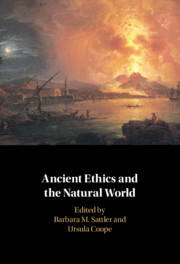Book contents
- Ancient Ethics and the Natural World
- Ancient Ethics and the Natural World
- Copyright page
- Dedication
- Contents
- Contributors
- Note on the Editors
- Introduction
- Part I Humans in Nature: Nature and Law, Humans and Natural Catastrophes
- Part II Humans as Godlike, Gods as Humanlike: Presocratics and Platonists
- Part III Emotions, Reason, and the Natural World (Aristotle)
- Part IV Action and the Natural World (Aristotle)
- Chapter 8 Chains That Do Not Bind: Causation and Necessity in Aristotle
- Chapter 9 Aristotle on Nature, Deliberation, and Purposiveness
- Part V The Naturalness of Goodness
- Bibliography
- Index Locorum
- General Index
Chapter 9 - Aristotle on Nature, Deliberation, and Purposiveness
from Part IV - Action and the Natural World (Aristotle)
Published online by Cambridge University Press: 13 August 2021
- Ancient Ethics and the Natural World
- Ancient Ethics and the Natural World
- Copyright page
- Dedication
- Contents
- Contributors
- Note on the Editors
- Introduction
- Part I Humans in Nature: Nature and Law, Humans and Natural Catastrophes
- Part II Humans as Godlike, Gods as Humanlike: Presocratics and Platonists
- Part III Emotions, Reason, and the Natural World (Aristotle)
- Part IV Action and the Natural World (Aristotle)
- Chapter 8 Chains That Do Not Bind: Causation and Necessity in Aristotle
- Chapter 9 Aristotle on Nature, Deliberation, and Purposiveness
- Part V The Naturalness of Goodness
- Bibliography
- Index Locorum
- General Index
Summary
This chapter discusses Aristotle’s puzzling claim that ‘craft does not deliberate’ (Physics II.8). This claim is made in answer to an imagined objection: craft and nature cannot be analogous because craft-production involves deliberation. The claim is puzzling, as it seems obvious that certain craftsmen will need to deliberate if they are to do their jobs well. In response, Coope argues (following Sedley) that Aristotle is not denying that particular craftsmen deliberate. His point is rather that the craft itself does not deliberate. However, this response itself gives rise to a second puzzle: how is this claim (that the craft itself does not deliberate) relevant to defending Aristotle’s analogy between craft and nature? In response, Coope argues that Aristotle’s point is that it is the craft that explains the purposiveness of a process of craft-production and, analogously, it is the nature that explains the purposiveness of a natural process. In each case, the source of purposiveness is something that does not deliberate. The chapter ends by suggesting that this solution itself raises a new difficulty for Aristotle: can he give an analogous account of the purposiveness of those ordinary human intentional actions that are not cases of craft-production?
- Type
- Chapter
- Information
- Ancient Ethics and the Natural World , pp. 164 - 182Publisher: Cambridge University PressPrint publication year: 2021

